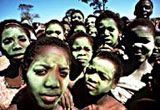9.5.2006 | 09:53
BaBemba žjóšflokkurinn
Žetta er saga śr bókinni um fyrirgefninguna, veit ekki hvort hśn er sönn eša hvaš en engu aš sķšur įhugaverš:
"In the Babemba tribe, when a person acts irresponsible or unjustly, he or she is placed in the center of the village, alone, unfettered. All work ceases. The entire village gathers around the accused individual. Then each person of every age begins to talk out loud to the accused. One at a time, each person tells ALL THE GOOD THINGS the one in the center ever did in his or her lifetime.
Every incident, every experience that can be recalled with any detail and accuracy, is recounted. All positive attributes, good deeds, strengths, and acts of kindness are recited carefully and at length. No one is permitted to fabricate, exaggerate or be facetious about the accomplishments or positive aspects of the accused person.
The tribal ceremony often lasts several days, not ceasing until everyone is drained of every positive comment that can be mustered. At the end, the tribal circle is broken, a joyous celebration takes place, and the person is symbolically welcomed back into the tribe. Necessity for such ceremonies is rare."
Hér er hrósaš ķ staš žess aš hegna fyrir afbrot, ansi sérstakt.
----------------------------------------------------------
Hér eru auk žess nokkur oršatiltęki frį žessum žjóšflokki sem er ķ Zambķu:
1. Uwa kwensha ubushiku ba mutasha nga bwacha
Meaning: "You can only thank the person who helped you walk in the night once it is dawn." This saying implies that most beneficial things are difficult to implement, but once implemented everyone can see the benefits and are grateful.
2. Umwana ashenda atashishe nina uku naya.
Meaning: "The child that has never travelled, thinks its mother is the best cook there is." This saying implies that until you are exposed to other places by travelling, your notion will always be that what you see around your country is the best. Yet there can be, and there are, cultures more advanced than yours in their own ways.
3. Imiti iikula empanga
Meaning: "The young trees are the forest". This saying applies to children who are the future of tomorrow.
tekiš af wikipedia.com
Flokkur: Trśmįl og sišferši | Breytt s.d. kl. 19:37 | Facebook



 salvor
salvor
 varmarsamtokin
varmarsamtokin
 mariakr
mariakr
 hugdettan
hugdettan
 halo
halo
 brjann
brjann
 erna-h
erna-h
 killjoker
killjoker
 gretaulfs
gretaulfs
 gudjonelias
gudjonelias
 zeriaph
zeriaph
 laugardalur
laugardalur
 heidistrand
heidistrand
 skessa
skessa
 katrinsnaeholm
katrinsnaeholm
 kolgrima
kolgrima
 lhm
lhm
 larahanna
larahanna
 mortenl
mortenl
 amman
amman
 tilkynning
tilkynning
Bęta viš athugasemd [Innskrįning]
Ekki er lengur hęgt aš skrifa athugasemdir viš fęrsluna, žar sem tķmamörk į athugasemdir eru lišin.